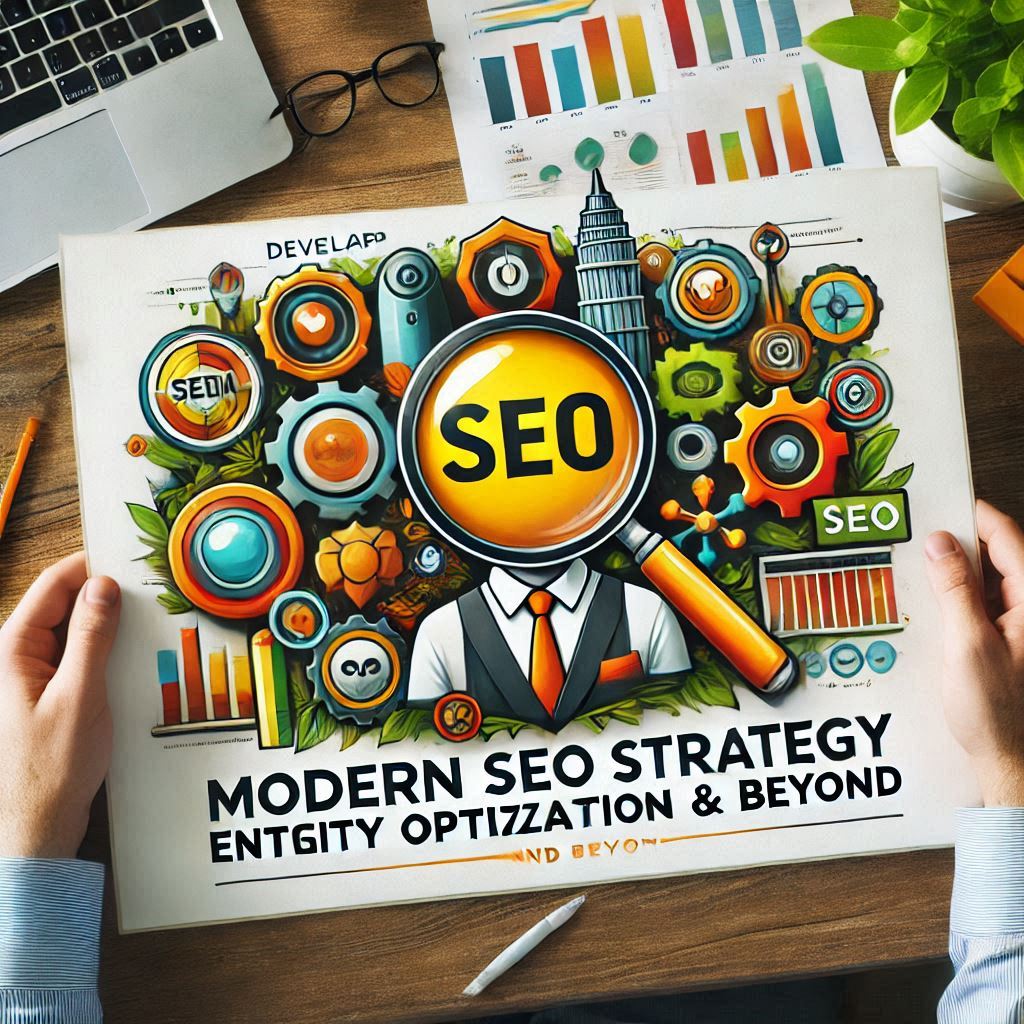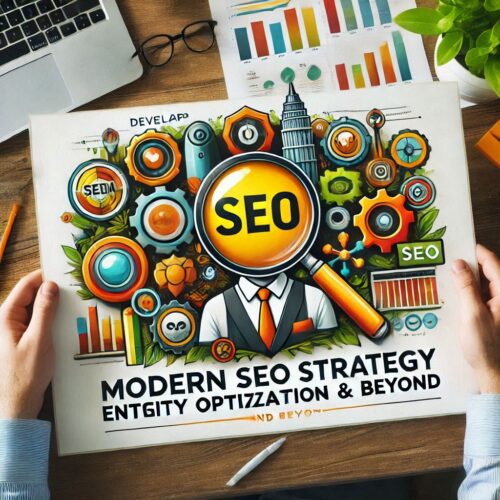Modern SEO Strategy Entity Optimization and Beyond. The world of SEO has been evolving rapidly, especially with the rise of generative AI and enhanced content evaluation systems. Today, SEO goes beyond traditional tactics like keyword optimization and backlinks. To stay competitive, businesses must adapt by focusing on entity optimization and building trust with both Google and their audiences. Here’s a breakdown of the modern SEO trends that marketers need to consider:
Modern SEO Strategy Entity Optimization and Beyond
1. Elevate Your Content’s Credibility Beyond the Page
As Google’s algorithms grow smarter, content quality alone is not enough. Google now evaluates the credibility of the content, its creator, and the publisher using E-E-A-T (Experience, Expertise, Authoritativeness, and Trustworthiness) principles. SEO strategies must now incorporate:
- Content Creator Optimization: Secure Knowledge Panels for content creators.
- Publisher Optimization: Ensure Knowledge Panels for companies and key figures like CEOs.
- Use of Hub-Spoke-Wheel Model: Establish a strong web presence for the content and its creators through interconnected relationships with other sources and media.
These changes help build a reputation that directly impacts rankings and visibility in search engine results.
2. Rebuild Your Approach to Digital Authority
With over 97 billion triples extracted from 3.4 billion web pages, Google now focuses on structured data and the relationships between entities. While traditional backlinks are still important, linkless links (mentions without clickable links) and content relationships play an increasingly significant role in SEO. To establish digital authority:
- Focus on entity mentions and relationships across diverse content formats.
- Cultivate credibility relationships with topics, expertise, qualifications, and media mentions.
Over time, these efforts will create a robust entity-to-URI relationship that supports visibility across search engines, including Google and AI platforms like ChatGPT.
3. Craft Conversations, Not Just Keywords
Keywords are no longer the sole focus of SEO. With the rise of conversational search engines like ChatGPT, SEO needs to adapt to user intent throughout the buying funnel. This includes:
- Using natural language and intent-based keywords.
- Structuring content to support conversational flows, transitioning from one query to the next.
- Optimizing for generative search engines and keeping users within the ecosystem of platforms like Google, Bing, and AI assistants.
Marketers must align their content with how users engage with it, ensuring that the conversation continues seamlessly across different platforms.
4. Build a Multi-Modal Content Strategy
As search engines become more multimodal, focusing on rich media like videos, images, and interactive content is crucial. Google and Bing now prioritize multimedia elements in search results, such as:
- Carousels
- Video boxes
- Knowledge panels
- Entity lists
While written content will always play a role, its visibility may diminish as these rich elements take center stage. Therefore, a multi-modal approach that integrates written, visual, and video content will ensure your brand remains visible across diverse search platforms.
5. Redefine Your Visibility Beyond Traditional Results
While blue links (traditional search results) are still the foundation of SEO, their direct influence is waning. To adapt, focus on:
- Influencing AI-driven results such as chatbots and virtual assistants.
- Ensuring your content is represented in generative SERPs and on-SERP results (elements like knowledge panels and featured snippets).
- Focusing on user intent and creating content that drives engagement within walled garden ecosystems.
This approach ensures visibility in emerging search formats, making traditional SEO tactics increasingly indirect.
6. Optimize Your On-SERP Brand Presence
The shift to on-SERP SEO is a crucial strategy in today’s digital landscape. Platforms like Google and Bing are increasingly focusing on in-SERP results, including:
- Knowledge elements (e.g., knowledge panels, FAQ snippets).
- Multimedia features like videos and images.
- Generative results that provide immediate answers.
To capture this growing space, optimize your content for these features while building a strong digital footprint and brand presence across all SERP elements.
7. Extend Your Brand Visibility Across Digital Touchpoints
As websites become less central, brands must maintain a consistent presence across various digital touchpoints. This includes:
- Optimizing for social media, review sites, and forums.
- Ensuring that your brand message remains consistent across all platforms and channels.
- Using your website as a hub that connects all your digital marketing efforts, ensuring your content reaches your audience wherever they are.
The goal is to meet your audience on the platforms they frequent and guide them back to your brand’s main presence.
8. Build a Brand That Machines Understand and Trust
In the future, brand optimization will be key to SEO success. Search engines will prioritize brands that are easy for machines to understand and trust. Focus on:
- Entity optimization: Establish a strong digital identity for your brand.
- Brand credibility: Leverage N-E-E-A-T-T principles to build trust.
- Niche content: Develop content that aligns with your brand’s unique value proposition and target audience.
A Google Knowledge Panel will become a critical asset for any brand looking to compete in the digital space. However, focusing only on Google could limit your reach. It’s essential to extend this entity optimization across multiple platforms.
9. Transform How You Signal Entity Information
Schema markup alone isn’t enough to ensure success in modern SEO. Google’s algorithms now use multiple signals to validate entities, including:
- Content: The clarity and structure of your page.
- Relationships: The connection between entities across the web.
- Corroboration: Information verified across trusted sources.
Implementing a hub-spoke-wheel model helps reinforce your entity’s credibility by linking back to corroborative sources and ensuring that all information aligns across the web.
Also Read – Microsoft Makes File Sharing Between iPhone and PCs Easier With New Link to Windows Feature
10. Master the Art of Entity Optimization
By 2025, securing a Knowledge Panel on Google will be the baseline requirement for SEO success. To optimize entities:
- Build a robust entity home with clear, structured information.
- Use schema markup to reinforce relationships.
- Ensure your entity is supported by multiple trusted sources.
Entity optimization will be the cornerstone of SEO, and those who master it will enjoy enhanced visibility and trust in search results.
Conclusion: Adapting to the Future of SEO In today’s digital environment, SEO is about more than just keywords and backlinks. To stay competitive, brands must embrace entity optimization, E-E-A-T principles, and multimodal content strategies. As AI and search engines evolve, the future of SEO will focus on content, creators, and publishers, requiring a more holistic approach to digital authority. By strategically adapting to these trends, businesses can ensure long-term success in the ever-changing world of SEO.




